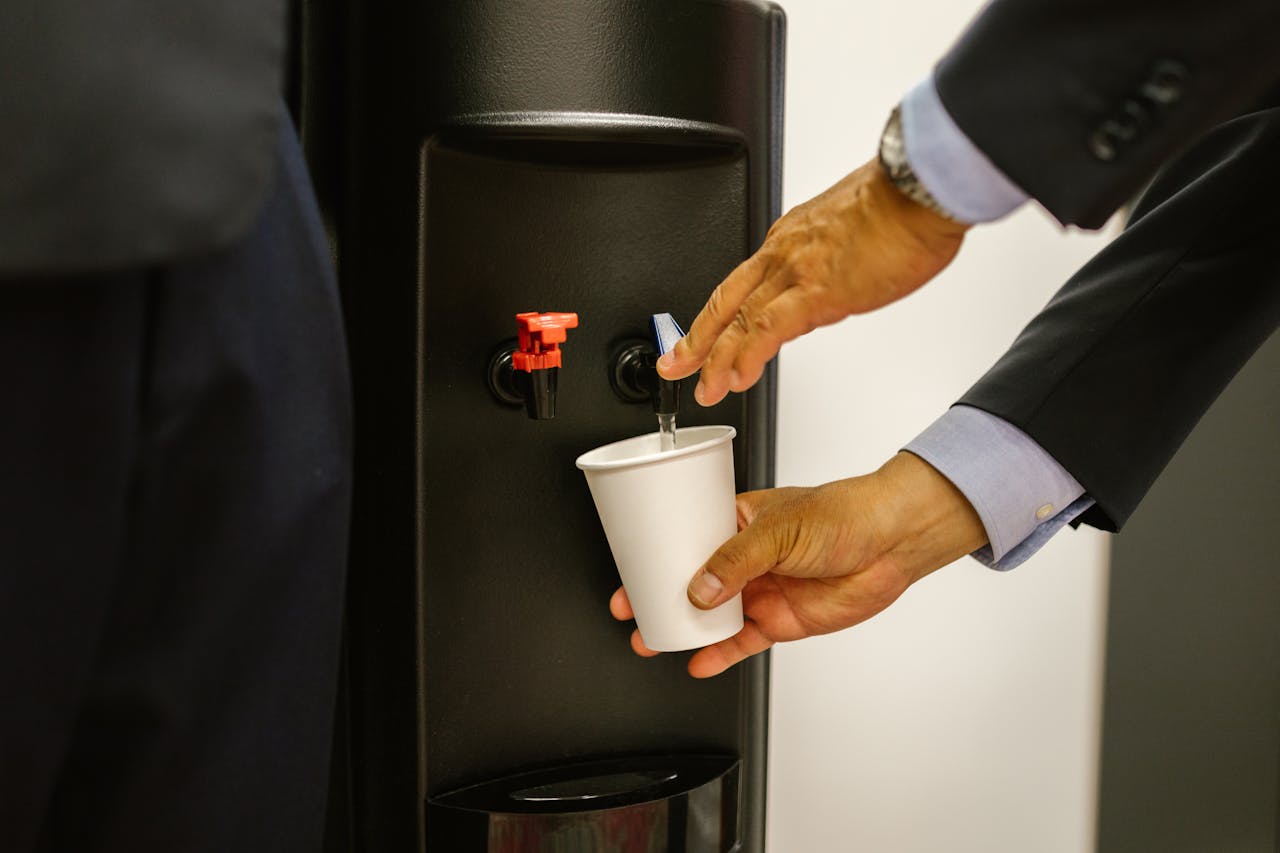Can Hydration Boost Your Productivity? The Link Between Water and Energy Levels

In today’s fast-paced world, productivity is key. We’re constantly looking for ways to do more, achieve more, and be our best selves. But what if one of the simplest ways to boost productivity was right under our noses – or more accurately, in our water glasses?
The impact of water goes far beyond basic survival. It plays a crucial role in how our bodies and minds function day to day. This article explores the fascinating connection between staying hydrated and maintaining high energy levels, potentially unlocking a new level of productivity in your personal and professional life.
The Science Behind Hydration and Energy
Water is not just a drink; it’s a vital component of our body’s complex machinery. Here’s how it affects our energy levels:
- Cellular Function:
- Water is essential for transporting nutrients to cells and removing waste products.
- Proper hydration helps maintain cell volume, which is crucial for optimal cell function.
- Dehydration can lead to decreased cell efficiency, resulting in fatigue and reduced energy.
- Brain Performance:
- The brain is approximately 75% water. Even mild dehydration can affect its performance.
- Water helps maintain proper blood volume, ensuring adequate blood flow to the brain.
- Hydration affects neurotransmitter function, which is crucial for cognitive processes.
- Dehydration and Energy:
- When dehydrated, your body prioritises vital functions, diverting energy from non-essential tasks.
- This can result in decreased physical performance and mental clarity.
- Studies show that even a 1-2% decrease in body water can lead to noticeable drops in cognitive and physical performance.
Signs of Dehydration in the Workplace
Recognizing the signs of dehydration is crucial for maintaining productivity. Here are some indicators to watch for:
- Physical Symptoms:
- Headaches: Often one of the first signs of dehydration.
- Fatigue: Feeling unusually tired or lethargic.
- Dry mouth and lips: A clear sign that your body needs more fluids.
- Dark urine: Well-hydrated individuals typically have pale yellow urine.
- Cognitive Symptoms:
- Difficulty concentrating: Tasks that usually come easily may suddenly seem challenging.
- Mood changes: Increased irritability or a general sense of mental discomfort.
- Slower reaction times: You might notice you’re not as quick to respond as usual.
- Impact on Productivity:
- These symptoms can significantly impact your work performance.
- Tasks may take longer to complete, and the quality of work may suffer.
- Creative problem-solving abilities may decrease, affecting innovation and efficiency.
Hydration and Cognitive Function
Proper hydration is crucial for maintaining optimal cognitive function:
- Memory and Attention Span:
- Studies have shown that well-hydrated individuals perform better on memory tasks.
- Attention span and focus can improve with adequate hydration, leading to fewer distractions and better productivity.
- Decision-Making Abilities:
- Dehydration can impair judgement and decision-making processes.
- Well-hydrated individuals often report clearer thinking and improved ability to weigh options.
- Reaction Times and Alertness:
- Proper hydration can lead to faster reaction times, crucial in many work environments.
- Overall alertness tends to be higher in individuals who maintain good hydration habits.
The Role of Hydration in Physical Performance
While cognitive function is crucial for productivity, physical well-being also plays a significant role. Here’s how hydration affects our physical performance:
- Energy Levels and Endurance:
- Proper hydration helps maintain blood volume, which is essential for delivering oxygen and nutrients to muscles.
- When hydrated, your heart doesn’t have to work as hard to pump blood, leading to better energy conservation.
- Studies have shown that even mild dehydration can lead to decreased endurance and increased perception of effort during physical tasks.
- Muscle Function and Coordination:
- Water is crucial for maintaining proper electrolyte balance, which affects muscle function.
- Dehydration can lead to muscle cramps and decreased coordination, impacting physical tasks at work.
- Proper hydration helps maintain muscle elasticity, reducing the risk of strains and improving overall physical performance.
- Thermoregulation:
- Water plays a vital role in regulating body temperature through sweating.
- In dehydrated states, the body’s ability to cool itself is compromised, leading to quicker fatigue and decreased performance in warm environments.
- Recovery and Fatigue Resistance:
- Adequate hydration aids in faster recovery after physical exertion.
- Well-hydrated individuals often report feeling less fatigued at the end of a workday, potentially leading to better work-life balance and increased productivity in personal time.
- Impact on Sedentary Work:
- Even in less physically demanding jobs, hydration affects comfort and focus.
- Proper hydration can reduce feelings of stiffness and discomfort associated with prolonged sitting.
- It may also contribute to better posture, reducing the risk of musculoskeletal issues that can impact long-term productivity.
- Hydration and Workplace Safety:
- In jobs requiring physical labour or operating machinery, proper hydration is crucial for maintaining alertness and reducing the risk of accidents.
- Dehydration-related dizziness or fatigue can lead to workplace injuries, emphasising the importance of hydration in overall workplace safety and productivity.
- Long-term Health and Productivity:
- Consistent proper hydration contributes to overall health, potentially reducing sick days and maintaining long-term productivity.
- It supports kidney function, helping to flush out toxins and maintain overall body health, which indirectly supports sustained productivity over time.
Optimal Hydration Strategies for the Workplace
Maintaining proper hydration at work isn’t just about drinking water when you’re thirsty. Here are some strategies to ensure optimal hydration:
- Determining Individual Water Needs:
- General guidelines suggest 8 cups (about 2L) of water daily, but needs vary based on factors like body size, activity level, and climate.
- A simple way to gauge hydration is to check urine colour – pale yellow indicates good hydration.
- Another method is to weigh yourself before and after a typical workday. If you’ve lost weight, that’s likely water weight, indicating you need to drink more during the day to replace what you’ve lost.
- Creating a Hydration Schedule:
- Once you have an idea of how much water you need, it’s helpful to create a hydration schedule. This involves planning when you’ll drink water throughout the day to ensure you meet your hydration needs.
- Set reminders to drink water regularly throughout the day. You could start your day with a glass of water to rehydrate after a night’s sleep. Then, aim to drink water at regular intervals throughout the day. This could mean having a glass of water every hour or two, or setting specific times for water breaks.
- Consider linking your water intake to specific work activities. For example, you could try the “drink water before each meal” or you could decide to drink water at the start of each new task, during breaks between meetings, or whenever you check your email. This can help build a consistent habit and make hydration a natural part of your work routine.
- Choosing the Right Beverages:
- Other beverages sure can contribute to your daily fluid intake, but it’s important to choose wisely. In as much as there are other options for hydration, water remains the best choice.
- Herbal teas and fruit-infused water can be good alternatives if you find plain water unappealing. They add flavour without adding calories or caffeine. Low-fat milk is another good option, as it provides hydration along with essential nutrients.
- Be cautious with caffeinated beverages like coffee and some teas. While they can contribute to your fluid intake, they also have a mild diuretic effect, which means they may increase urine production. It’s best to balance these with plenty of water.
- Avoid sugary drinks and excessive amounts of fruit juice. While they provide fluid, they also add unnecessary calories and can lead to energy crashes that harm productivity.
Tools and Techniques to Improve Hydration Habits
Technology and workplace initiatives can help:
- Water Tracking Apps and Devices:
- Apps like WaterMinder or Hydro Coach can help track water intake.
- Smart water bottles can remind you to drink and track your consumption.
- Workplace Initiatives:
- Companies can provide easily accessible water stations.
- Some workplaces organise “hydration challenges” to encourage good habits.
- Water-Rich Foods:
- Incorporate fruits and vegetables with high water content into your diet.
- Examples include cucumbers, watermelon, and leafy greens.
Case Studies: Real-world Examples of Hydration Improving Productivity
- Corporate Hydration Programs:
Google, one of the best places to work if not the best, focuses on proper hydration for its members of staff. They make water easily accessible in their offices and do so in such a way that it draws people to drink (they hide sodas and make water more visible). According to one member of staff, their research showed that people consumed 40 percent more water if that’s the first thing they see. Hence they make water more visible.
- Athletes and Hydration:
Professional basketball player LeBron James emphasises proper hydration. In one interview he stated that he tries to stay away from artificial drinks.
Potential Drawbacks of Overhydration
While proper hydration is crucial, there can be too much of a good thing:
- Disrupted Sleep:
Drinking too much water close to bedtime can lead to nighttime bathroom trips, disrupting sleep.
- Risk of Water Intoxication:
While rare, consuming excessive amounts of water can lead to hyponatremia, a dangerous condition where sodium levels in the blood become diluted.
- Finding the Right Balance:
Listen to your body and adjust your water intake based on your activity level and environment.
Consult with a healthcare professional if you have concerns about your hydration needs.
Conclusion
Proper hydration is a simple yet powerful tool for boosting productivity. By understanding the science behind hydration and implementing smart strategies, you can enhance both your physical and mental performance at work.
As we reflect on the importance of hydration in our daily lives, it’s crucial to recognize that access to clean water is not universal. At AquaMaya, we are working tirelessly to address this global issue.
For us, “Give Water Give Life,” is not just a catch phrase, it summarises our focus on providing clean water access to 10 million people in West Africa. Our efforts aim to reduce child mortality from waterborne diseases and improve overall quality of life. By supporting our initiative, you not only acknowledge the importance of hydration but also contribute to making clean water accessible to those who need it most.
Support AquaMaya’s cause today. Your contribution could help provide someone with their first reliable source of clean water, potentially transforming their health, productivity, and future. To learn more about our work at AquaMaya or to get involved, visit our website.
Don’t forget, staying hydrated is now beyond personal productivity, it’s about recognizing water as a fundamental human right and working towards a world where everyone has access to this vital resource.
Sources:
- Riebl SK, Davy BM. The Hydration Equation: Update on Water Balance and Cognitive Performance. ACSMs Health Fit J. 2013 Nov;17(6):21-28. doi: 10.1249/FIT.0b013e3182a9570f. PMID: 25346594; PMCID: PMC4207053. https://www.ncbi.nlm.nih.gov/pmc/articles/PMC4207053/
- Masento NA, Golightly M, Field DT, Butler LT, van Reekum CM. Effects of hydration status on cognitive performance and mood. British Journal of Nutrition. 2014;111(10):1841-1852. doi:10.1017/S0007114513004455 https://www.cambridge.org/core/journals/british-journal-of-nutrition/article/effects-of-hydration-status-on-cognitive-performance-and-mood/1210B6BE585E03C71A299C52B51B22F7
- https://www.healthline.com/nutrition/7-health-benefits-of-water
- Luo Y, Chen Hsu C, Jui Lin K, Kai Fu S, Ru Chen J, Lai CC. Effectiveness of a Water Intake Program at the Workplace in Physical and Mental Health Outcomes. Inquiry. 2022 Jan-Dec;59:469580221085778. doi: 10.1177/00469580221085778. PMID: 35403464; PMCID: PMC8998380. https://www.ncbi.nlm.nih.gov/pmc/articles/PMC8998380/
- https://www.healthline.com/nutrition/7-health-benefits-of-water
- Popkin BM, D’Anci KE, Rosenberg IH. Water, hydration, and health. Nutr Rev. 2010 Aug;68(8):439-58. doi: 10.1111/j.1753-4887.2010.00304.x. PMID: 20646222; PMCID: PMC2908954. https://www.ncbi.nlm.nih.gov/pmc/articles/PMC2908954/
- https://www.healthline.com/health/food-nutrition/why-is-water-important
- Trinies V, Chard AN, Mateo T, Freeman MC. Effects of Water Provision and Hydration on Cognitive Function among Primary-School Pupils in Zambia: A Randomized Trial. PLoS One. 2016 Mar 7;11(3):e0150071. doi: 10.1371/journal.pone.0150071. PMID: 26950696; PMCID: PMC4780815. https://www.ncbi.nlm.nih.gov/pmc/articles/PMC4780815/






